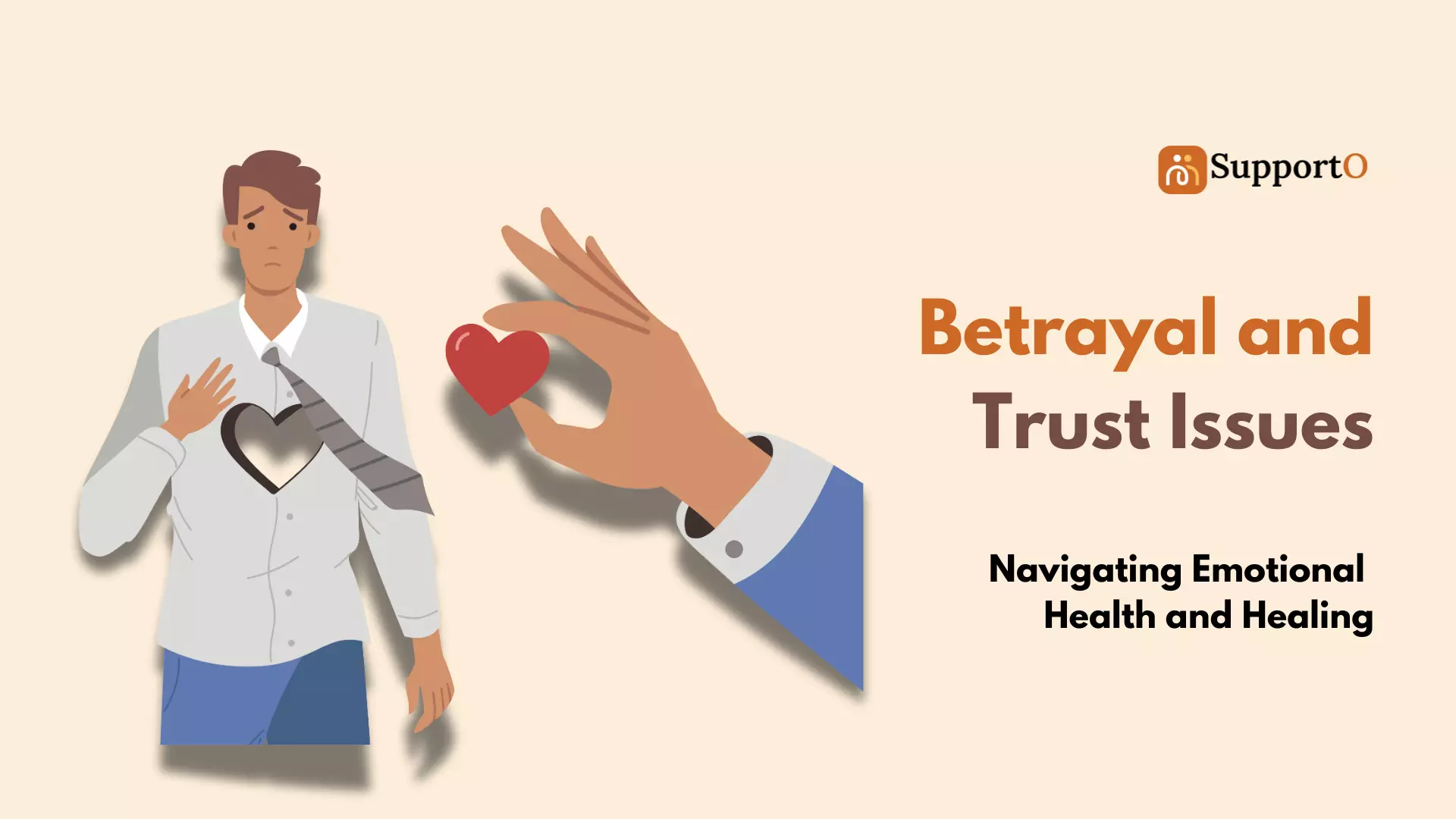Betrayal and Trust Issues: Navigating Emotional Health and Healing
Trust is the underpinning of every relationship — romantic, familial, professional, and otherwise. When betrayal happens, there is nothing that can bring balance to emotional stability, causing stress, anxiety, and long-term trust issues. Infidelity, lies, shattered promises, and falling out of friendships are different types of betrayal.
With Valentine’s Week coming to a start, a period when love and relationships are at the forefront, a significant number find themselves battling old emotional scars inflicted by betrayals.
As you know, healing from betrayal can help, through self-care sometimes will take someone with you, therapy, or counseling. This need for a safe, empathetic support space is fulfilled using platforms like SupportO, an emotional support platform. In this blog, we will discuss betrayal and its effects on emotional health, how to rebuild trust, and how therapy/counseling can help you recover from such experiences.
The Emotional Impact of Betrayal
The wounds of betrayal run deep, and it hurts our mental and overall health. Here are some of the general psychological effects:
1. Stress & Anxiety – Betrayal will leave anyone in chronic stress, overthinking about the relationship in the past, and worrying about getting back to someone again.
2. Depression – Self-worth is lost and people fall into depressive thoughts after being wronged.
3. Fear of Intimacy – A person may become wary of opening up to new relationships if they have recently experienced betrayal.
4. Loss of Self-Esteem – Betrayal leads people to doubt their judgment and unlearn trust in their own instincts.
Recognizing these emotional reactions is vital to starting the healing process.
Coping with Betrayal: Steps to Emotional Recovery
Healing from betrayal is not instantaneous but there are actionable steps to restore emotional equilibrium and move forward:
1. Acknowledge Your Feelings
Bottling up feelings may cause deeper mental health issues. Acknowledge that it is okay to grieve, to be upset, and healthily process the betrayal. Journaling, meditating, or talking it out with a trusted friend can help to get out these pent-up feelings.
2. Seek Emotional Support
Such platforms like SupportO provide a non-judgmental space to share your struggles with a professional counselor. Therapists and counselors can help you work through trust issues in a safe space.
3. Set Healthy Boundaries
Once trust is shattered, it’s really important to set boundaries to protect your emotional well-being.” You may need to cut people out of your life if they have hurt you multiple times, so you can avoid ways to hurt yourself emotionally.
4. Prioritize Self-Care and Mental Well-Being
Find time for things that heal you (for example, yoga, exercise, reading, hobbies). It is also the time when you learn to develop self-love and self-compassion.
5. Seek Professional Therapy or Counseling
Therapy is an essential component in combating trust issues. Counseling sessions can also help with identifying triggers, processing pain, and coping in healthier ways. SupportO, the emotionally supportive app targets those facing emotional distress and could be your best bet for expert counseling.
Rebuilding Trust: Is It Possible?
Although betrayal often breaks trust, it can be repaired over time and through effort and common agreement. How to rebuild trust in relationships:
1. Transparent Communication – When we say what we are concerned about or how we feel about something, it leaves no room for us to misunderstand each other and strengthens our relationships.
2. Consistency in Actions — Trust can be repaired by consistent actions, honesty and reliability.
3. Forgiveness (When Ready) — Real forgiveness is not forgetting, but letting go with your own peace of mind.
4. Therapeutic Intervention – A therapist can help individuals determine whether a relationship is worth rebuilding or if the healthiest course of action would be to move on and away.
Valentine’s Week and Healing the Heart
Valentine's Week can be a time for those with trust issues, reminding them of past betrayals But it can also be a chance to work on self-love and emotional growth. Rather than regarding the occasion as an agonizing reminder, think:
1. Spending time or connecting with supportive friends and family.
2. Doing something nice for yourself — going to the spa, meditating, or taking a trip alone.
3. A letter to yourself about your growth and resilience.
4. User looking for emotional support within the community or support platform like SupportO
Conclusion
Unfaithful and broken trust affect emotional health very much — stress, anxiety, and difficulty finding a partner are just some of the common effects. But with the right psychological support, therapy, and self-care techniques, healing is possible. Regardless of the method — counseling, self-reflection, or support from platforms such as SupportO — the initial step toward emotional healing is taking that first step toward confidence and trust again.
Valentine’s Week doesn’t need to be an excruciating reminder of betrayal, it can also be a time devoted to self-love, growth and emotional recovery. Take care of yourself mentally, reach out to whoever you may need, and know that trust can be restored, either in yourself or in future people.
Start going through tips to cope with trust issues or emotional distress, and get guidance and counseling from SupportO.
